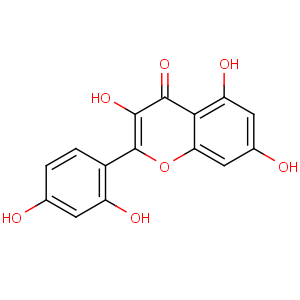Title: Morin
CAS Registry Number: 480-16-0
CAS Name: 2-(2,4-Dihydroxyphenyl)-3,5,7-trihydroxy-4
H-1-benzopyran-4-one
Synonyms: 2¢,3,4¢,5,7-pentahydroxyflavone; 2¢-hydroxypelargidenolon 1522; C.I. Natural Yellow 8; C.I. Natural Yellow 11; C.I. 75660
Molecular Formula: C15H10O7
Molecular Weight: 302.24
Percent Composition: C 59.61%, H 3.33%, O 37.06%
Literature References: In wood of old fustic
(Chlorophora tinctoria (L.) Gaud.,
Moraceae), also called Cuba wood, or yellow Brazil wood. The wood of the Osage orange tree also contains morin and maclurin. Isoln: Perkin, Pate,
J. Chem. Soc. 67, 649 (1895); Rolland,
Teintex 3, 460 (1938). Synthesis by condensing phloracetophenone dimethyl ether with 2,4-dimethoxybenzaldehyde: von Kostanecki
et al., Ber. 39, 625, 4014, 4022 (1906). Comprehensive list of refs in
Colour Index vol. 4 (3rd ed., 1971) p 4636.
Properties: Crystallizes with 1 or 2 mols water. Anhydr needles from abs alcohol, dec 285-290°. One gram dissolves in 4 liters water at 20°, in 1060 ml boiling water. Freely sol in alcohol; slightly sol in ether, acetic acid. Sol in aq alkaline solns with intense yellow color which turns brown on exposure to air. Absorpion spectrum: Grinbaumowna, Marchlewski,
Biochem. Z. 290, 261 (1937).
Derivative Type: Calico yellow
Properties: Obtained by the action of bisulfite on fustic extract consists mainly of the bisulfite compound of morin, C15H10O7 + NaHSO3, and is used in calico printing. The calico yellow of commerce is a good source of morin for the laboratory. The bisulfite is removed with HCl.
Use: As a spot test reagent for Al, Be, Zn, Ga, In, and Sc salts: Feigl,
Spot Tests (New York, 1954); Beck,
Mikrochim. Acta 2, 287 (1937). As luminescence indicator: Kocsis, Zádor,
Z. Anal. Chem. 124, 42-45 (1942). As a textile dye, morin dyes wool mordanted with chromium: olive yellow; mordanted with aluminum: yellow; mordanted with tin: lemon yellow; mordanted with iron: deep olive brown.

